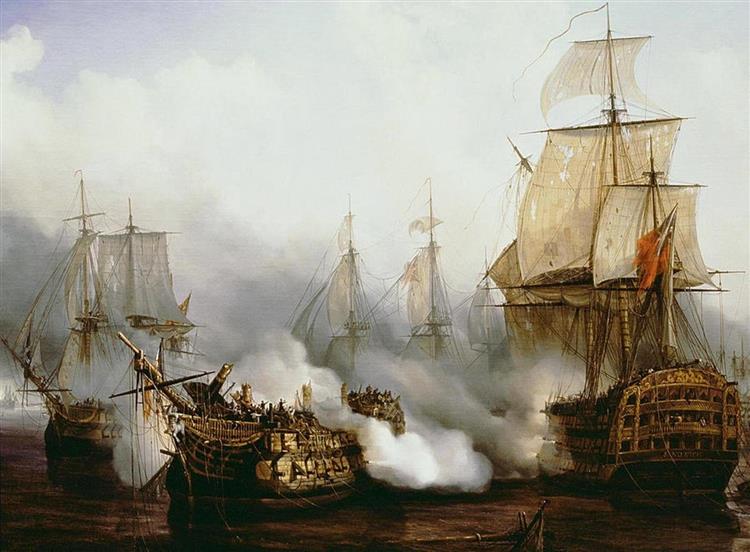The Battle of Trafalgar was a naval engagement fought on October 21, 1805, off the southwestern coast of Spain. The battle was between the British Royal Navy, commanded by Admiral Lord Nelson, and the combined fleets of France and Spain under the command of French Admiral Pierre-Charles Villeneuve. The battle resulted in a decisive victory for the British, but it also marked the death of Admiral Nelson, who was shot by a French sniper.
The Battle of Trafalgar was a significant event in naval history, and it was a turning point in the Napoleonic Wars. The British victory at Trafalgar ensured that Napoleon would never be able to invade Britain, and it established Britain as the dominant naval power in the world. The battle was also notable for the innovative tactics used by Lord Nelson and his commanders, which included the famous "Nelson Touch" maneuver.
The "Nelson Touch" maneuver was one of the key tactics used by Admiral Lord Nelson and his commanders during the Battle of Trafalgar. The maneuver involved dividing the British fleet into two columns and sailing them straight into the enemy's line of battle. This allowed the British to break through the enemy's line and engage them in close combat, which was the preferred method of fighting for the British sailors.
The "Nelson Touch" was a risky maneuver, but it was also highly effective. It allowed the British to engage the enemy at close range and take control of the battle. The maneuver was named after Lord Nelson, who was known for his ability to inspire his troops and lead them to victory.
Lord Nelson's tactics and leadership skills were critical to the British victory at Trafalgar. He was able to outmaneuver the combined French and Spanish fleets and engage them in close combat, which was the British Navy's strength. Nelson also made sure that his sailors were well-trained and well-prepared for the battle, which was essential to their success.
Lord Nelson was a brilliant military leader who had a talent for inspiring his troops and leading them to victory. He was known for his courage and his willingness to take risks, as well as for his ability to think strategically and outmaneuver his opponents. One of his most famous quotes is, "England expects that every man will do his duty," which he gave to his fleet before the Battle of Trafalgar.
Another key factor in the British victory at Trafalgar was the use of the "fire ship" tactic. The British Navy sent a number of small, unmanned ships filled with explosives into the enemy fleet, which caused chaos and confusion among the French and Spanish sailors. This allowed the British to break through the enemy's line and engage them in close combat.
Napoleon Bonaparte was also a brilliant military leader, but he had a different approach to warfare than Nelson. Napoleon was known for his ability to mobilize large armies and for his use of innovative tactics, such as the use of artillery and the creation of temporary pontoon bridges. He was also a master of propaganda and was able to use his charisma and his reputation to inspire his troops and intimidate his enemies.
In terms of military campaigns, the Battle of Trafalgar was similar to other naval engagements of the time, such as the Battle of the Nile in 1798 and the Battle of Copenhagen in 1801. However, the Battle of Trafalgar was unique in that it marked the end of Napoleon's plans to invade Britain, and it established British naval dominance for decades to come.
One interesting anecdote about Lord Nelson is that he was known for his disregard for personal safety during battle. At the Battle of the Nile, he was wounded in the face and lost the sight in his right eye. At the Battle of Copenhagen, he famously held a telescope to his blind eye and said, "I really do not see the signal," in order to continue the attack despite orders to withdraw.
Another interesting anecdote about Napoleon is that he was known for his attention to detail and his ability to plan ahead. Before the Battle of Austerlitz in 1805, he predicted the movements of the Russian and Austrian armies and was able to position his troops accordingly, resulting in a decisive victory for the French.
In conclusion, the Battle of Trafalgar was a significant event in naval history, and it marked the end of Napoleon's plans to invade Britain. Lord Nelson and Napoleon were both brilliant military leaders, but they had different approaches to warfare. Lord Nelson was known for his courage and his ability to inspire his troops, while Napoleon was known for his ability to mobilize large armies and for his use of innovative tactics. Both leaders were masters of strategy and were able to outmaneuver their opponents, but their legacies have been shaped by their different approaches to warfare.

Comments